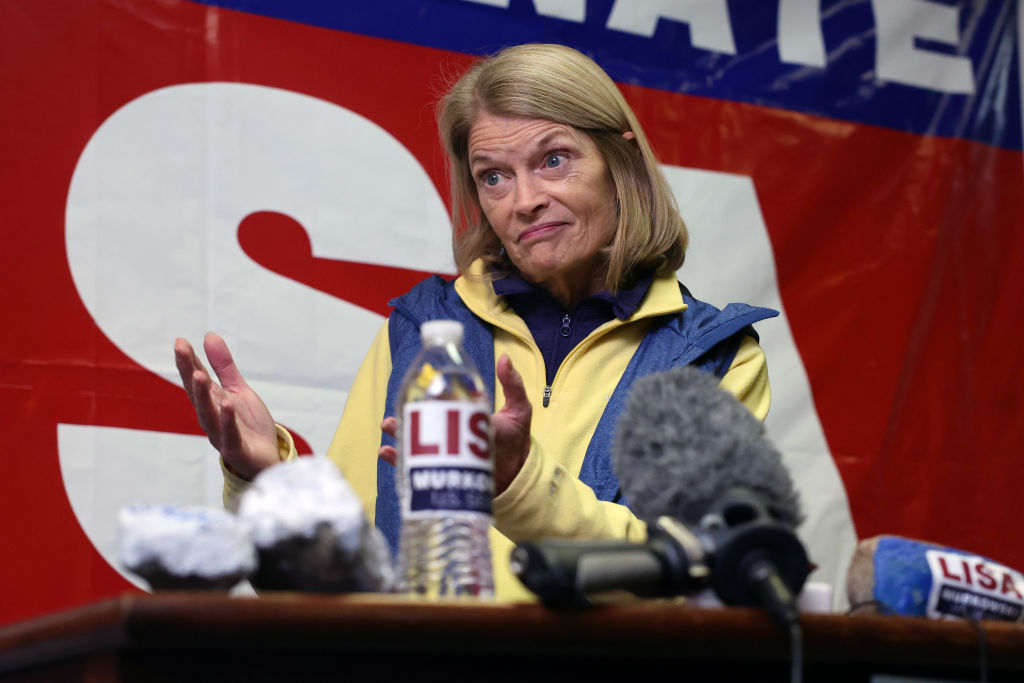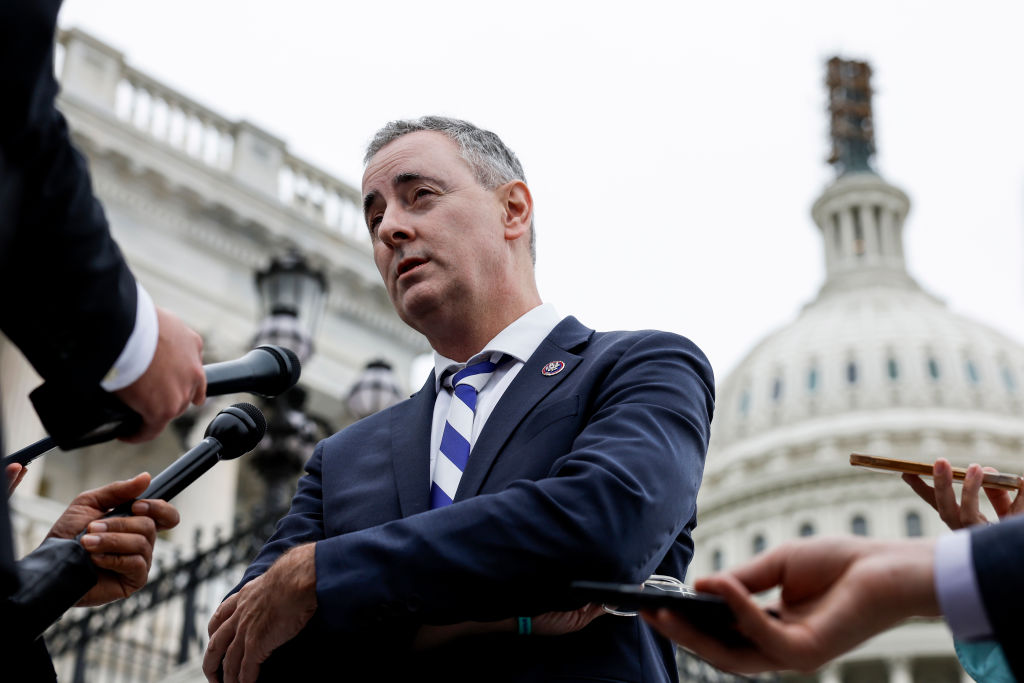
On their way out of the Senate, Kyrsten Sinema and Joe Manchin had a little parting gift for their former Democratic colleagues. The pair, who left the party to become independents but who still caucus with the Democrats, shot down President Joe Biden’s nomination of Lauren McFerran to serve another five years on the National Labor Relations Board.
Had Manchin and Sinema gone along, it would have given Democrats a majority on the powerful panel for at least the first two years of President-elect Donald Trump’s term. Now, Trump will get two picks on the five-member panel and put Republicans back in control after four years of Democratic majority.
The blue team was not happy. Sen. Bernie Sanders called Manchin and Sinema’s move “pathetic,” and Sen. Elizabeth Warren declared, “Millions of working people across the country will pay the price for their actions.”
It all recalled the now faded memory of when progressives decided that they were going to drum Sinema and Manchin out of the Senate. It can’t be said that it worked with Manchin, who is leaving office not because of a primary threat but because his home state of West Virginia is now just too Republican to allow for even a turncoat Democrat to get through a general election. But Sanders and Co. certainly tried.
It might be better argued that it worked with Sinema, who left her party and then retired ahead of a looming primary fight with Sen.-elect Ruben Gallego. The intraparty fight could have cost Democrats yet another Senate seat, but the progressives were doubly lucky in Arizona. Not only are there enough left-wing primary voters in the competitive state to make a moderate Democrat uncomfortable in a primary, but Republicans fumbled their chance to win the seat by nominating failed gubernatorial candidate Kari Lake for a race that almost any mainstream GOP candidate would have surely won.
Thus closes the four-year story of apostate Senate Democrats in our age of narrow majorities. Sinema and Manchin will leave their former conference more ideologically narrow and now in minority status.
So what does that portend for the incoming Republican majority?
We can already see a similar trend playing out as supporters of President-elect Donald Trump are setting traps for the would-be moderates in the Manchin/Sinema mold.
Sen. Lisa Murkowski told an audience this week that with the all-out blitz to get uniform support for even the most controversial of Trump’s nominees, “We’re getting a little bit of a preview now of what it’s going to mean to be allegiant to party, and I don’t think that that’s going to help us as a Republican Party.”
She was talking about the primary threats made against Iowa Sen. Joni Ernst, a rock-ribbed conservative from Iowa, for expressing even modest reservations about the selection of Pete Hegseth to lead the Pentagon.
Sen. Cynthia Lummis of Wyoming seconded Murkowsi: “This early? This is all going to backfire.”
Certainly it did for Democrats who tried to enforce similar strictures on their moderate members. And with voters decidedly uncertain about the team Trump is building now seems like a bad time to start calling moderates to the carpet. Two years is a long time to keep a conference together.
Holy croakano! We welcome your feedback, so please email us with your tips, corrections, reactions, amplifications, etc. at STIREWALTISMS@THEDISPATCH.COM. If you’d like to be considered for publication, please include your real name and hometown. If you don’t want your comments to be made public, please specify.
STATSHOT
Polling Roulette

TIME OUT: FUNNY HOW TIME SLIPS AWAY
Bitter Southerner: “Willie Nelson — whose nicknames include the Redheaded Stranger, Shotgun Willie, and the Hillbilly Dalai Lama — straps on his old guitar and sits on a stool for the last set of the day. … The agony of aging is on display, but I can tell without a doubt that he’s flat-out happy to be here tonight. … His acceptance and love for all and his desire to share his music, which is not proscriptive, feels healing on this night celebrating America’s 248th year of independence. … ‘Did they come to see the Cosmic Cowboy? Did they come to see the Nashville songwriter? Did they come to see the Farm Aid guy? … Whatever you want to telegraph onto Willie, you can do that. And you’re probably right. He is that person,’ [says author Joe Nick Patoski]. … After the final chord is strummed, Willie stands and waves and smiles to the crowd before he says, ‘Y’all have a good evening. We love you.’ I leave feeling purified. I’m happy to know that in this America of 2024 there is still love, the kind Willie is sharing.”
ACTIVIST GROUPS DELUDED DEMS ON IMMIGRATION POLITICS
The Atlantic: “For more than a decade, Democrats have struck an implicit electoral bargain: Even if liberal immigration stances alienated some working-class white voters, those policies were essential to holding together the party’s multiracial coalition. That bargain now appears to have been based on a false understanding of the motivations of Latino voters. How did that misreading become so entrenched in the first place? Part of the story is the rise of progressive immigration-advocacy nonprofits within the Democratic coalition. … These groups convinced party leaders that shifting to the left on immigration would win Latino support. … The Democratic Party’s embrace of these groups was based on a mistake that in hindsight appears simple: conflating the views of the highly educated, progressive Latinos who run and staff these organizations, and who care passionately about immigration-policy reform, with the views of Latino voters, who overwhelmingly do not. … Avoiding that mistake might very well have made the difference in 2016 and 2024.”
Trump won the “working class”—but what does that really mean? Vox: “The problem with having such a vague—or in some cases broad—definition of ‘working class’ is that it becomes politically meaningless to talk about the working-class vote. … A common image that politicians conjure up when talking about the working class is that of a unionized manufacturing worker. … But that image of the working class no longer captures what many people are referring to. For starters, union jobs don’t make up that large of a share of the overall labor market. … On the surface, income might seem like the easiest way to understand class divides. … But someone’s current income or wealth doesn’t necessarily determine their class. That leads to another way we define working class: whether or not someone has a college degree. … Ultimately, understanding a person’s class requires also taking into account how they feel about their place in society.”
The polls nailed 2024’s important stories: New York Times: “When judged against the final results, the polls missed by a more or less average margin. And, worryingly, they systematically underestimated support for Donald J. Trump for the third cycle in a row. But by a less conventional measure — value more than accuracy — the polls excelled. … Big Trump gains among young and nonwhite voters and a huge decline in racial polarization? Check. … A Trump advantage among low-turnout voters, one so great that it merited disregarding Democratic strength in special elections and off-year general elections? Check. … A reduced gap between the popular vote and the Electoral College, and even a Trump popular vote victory? Check. … From the start, the polls said a Biden-Trump rematch would be nothing like the 2020 election. … It’s hard to think of a cycle when so many polls, so far ahead of time, wound up telling the tale.”
Musk hit nearly $250 million in Trump donations: Wall Street Journal: “Elon Musk poured roughly a quarter of a billion dollars into two pro-Trump political groups during the recent election cycle, new filings show. … The billionaire gave a total of $238.5 million in cash and in-kind contributions during the cycle to America PAC. … That total included $75 million in the last two weeks of October alone. … The disclosures, in filings that became public late Thursday, show the extent to which Musk was a major financial force driving Trump’s successful campaign. … Since Trump’s election victory, Musk has been a steady presence alongside the president-elect at Mar-a-Lago, offering input on nominations and the formation of the cabinet. … Musk’s personal wealth is on track to jump by more than $100 billion since the election.”
Ohio, Florida Senate appointments test Trump: Washington Post: “The big question is whether a pair of governors who have had their differences with Trump, to varying degrees — Florida’s Ron DeSantis and Ohio’s Mike DeWine — will choose picks that enable Trump or maybe provide some more potential checks on him. … DeWine has provided few hints about his plans, except that he wants someone who can seek and win the seat in 2026. If recently defeated Sen. Sherrod Brown (D-Ohio) runs, that could be a tough race. … The big question for me is whether he goes for [Matt Dolan], who could be the biggest Trump skeptic of the bunch, or to a lesser extent [Frank LaRose]. … DeSantis has more of a political future to mind than DeWine, given he could run for president again. … Trump could cut a deal with DeSantis that could not only grease the skids for a Trump-y Senate pick, but possibly even an actual Trump: Lara Trump.”
BRIEFLY
Matt Gaetz lands prime-time talk show on pro-Trump OAN—CBS News
Andy Kim, Adam Schiff sworn into the Senate—Politico
Former candidate Sue Altman takes top spot in Kim’s office—New Jersey Globe
Georgia insurance commissioner plots 2026 Senate bid if Kemp bows out—Atlanta Journal-Constitution
WITHIN EARSHOT: BAH HUMBUG
“What’s a lunch break? Lunch is for wimps. … I'm not a sandwich person. I don't think sandwiches are a real food.”—U.K. Conservative Party leader Kemi Badenoch expresses her distaste for sandwiches—and lunch in general—in an interview with The Spectator.
MAILBAG
“Here's a question for you: In 2016 everyone talked about evangelicals and how they were such an important factor in the election and really delivered for Trump. No one talked about that for this election cycle. Was it the same story this time around? Have things changed?”—Justus Adamson, Durham, North Carolina
Mr. Adamson,
If that’s the case, I’ll count it as a very good thing!
First, there’s no question that Donald Trump had a smashing success with evangelical Christians, certainly with white ones. According to the Associated Press’ VoteCast, he won 79 percent of their votes this year and 57 percent of Latino evangelicals. Trump got just 18 percent of black evangelicals, but that’s no surprise given the strong and enduring opposition to Trump in the black community.
Trump’s evangelical numbers are actually down a tick from 2020, but still well ahead of his 2016 performance.
But that depends on how you mean the word “evangelical.” VoteCast uses that word interchangeably with the term “born again,” which, if you’re a Christian, isn’t exactly right. One might consider herself or himself to be “born again” “of water and the Spirit” as Jesus instructs Nicodemus but still not consider themself an “evangelical.”
Starting 40 years ago, pollsters went looking for a way to track the Americans who were part of the great awakening that was rippling through the American church. These voters tended to be more conservative and more spiritually engaged than the mainline Protestants of the earlier 20th century. Something new was happening, and demographers and politicos wanted to track it.
What happened, though, was that the subjects were changed by the observation.
I’ve written about this several times, but I’ll share from a 2021 piece I wrote on the subject:
“... being an Evangelical is totally subjective. If we ask voters if they are Catholic, the meaning is clear: Are they a member of the Roman Catholic Church? The same goes for other demographic variables like income, age, education, and gender. The terms are clear and connected to having, being, or doing something particular. Being an Evangelical is an attitude, and one of imprecise definition.
The new Pew research, the continuing decline in church attendance among self-professed Evangelicals, and the growth of what [David French] aptly describes as ‘angry Christian nationalism’ all point to the same conclusion: the term Evangelical has lost its salience as a term to describe religious practice. At the very least, the term has ceased to mean what [Billy Graham] & Co. intended. Increasingly, it’s just another way to say ‘politically conservative,’ a grouping we already use.
In 2017, Timothy Keller, America’s leading Protestant theologian, wondered whether Evangelicalism could survive its deepening ties to right-wing politics. While certainly the movement and its objective to win converts will live on, the term has lost its savor as a measure of religious sentiment. Those of us looking to track America’s cultural life and forecast elections need to get busy figuring out what can replace it.”
I’m sorry to say that we haven’t found a suitable replacement, but it is a very good start to mostly ignoring a statistic that doesn’t tell us very much and is corrosive to the group we intend to study.
Hopefully,
c
You should email us! Write to STIREWALTISMS@THEDISPATCH.COM with your tips, kudos, criticisms, insights, rediscovered words, wonderful names, recipes, and, always, good jokes. Please include your real name—at least first and last—and hometown. Make sure to let us know in the email if you want to keep your submission private. My colleague, the yuletided Nate Moore, and I will look for your emails and then share the most interesting ones and my responses here. Clickety clack!
CUTLINE CONTEST: TO GOVERN IS TO CHOOSE

The stakes are high today in one of only two weekly chances in a holiday-shortened December contest. The winner of last week’s and this week’s contests will vie for the last monthly award of 2024 and the final chance for our annual ham prize, which will be announced on December 21.
It’s not too late! Send your funniest newspaper-style caption for the photo at the top of this newsletter to STIREWALTISMS@THEDISPATCH.COM — funny, not cruel and not too dirty, if you please — along with your name and hometown and, presto, you could be in the running for the swine divine (or a smoked turkey substitute).
But first, on to the first of December’s two weekly winners, who found the laughs in this photo of Pennsylvania Republican Rep. Brian Fitzpatrick, the top-performing House Republican in a competitive district. Our winner saw that the funniest thing about the photo was the look on the congressman’s face:
“Rep. Brian Fitzpatrick appears exasperated as he is forced by reporters to choose between karaoke and selfies on the steps of the Capitol.”—Blake Royal, Houston, Texas
Winner, Scrooged Division:
“Bah, humbug!”—Mark Swedberg, Natal, Brazil
Winner, The Prosecution Rests Division:
“Rep. Brian Fitzpatrick demonstrates his canny ability to drift off to sleep and still answer reporters questions.”—Kevin Cook, Fort Worth, Texas
Winner, That’s Brian With a B Division:
“As I said before, I never played quarterback in the NFL.”—Dan Burch, Turlock, California
Winner, Not a Joke, Folks Division:
“Irish-American politician from eastern Pennsylvania pleads for public to stop sending him pardon requests.”—Linda McKee, DuBois, Pennsylvania
Winner, Lite-Weight Division:
“Tastes great OR less filling? Couldn’t it be both?”—Mary Stine, Prairie Village, Kansas
Winner, In the Scrum Division:
“No, as I told you before, my tie was not made from a rugby jersey.”—Paul Williams, Shaker Heights, Ohio
Winner, Dense Support Division:
“Yes, I would have to say it was important to get the endorsement of the guy on the Quaker Oats box.”—Allan Hardcastle, Lincoln, California
Winner, Draft Resolution Kings Division:
“Yes, I won but more importantly how did you all do? Did you have the parlay of Harris/Fitzpatrick in my district, the over in the over/under at 10% on my margin of victory, or the moneyline on me at -230?”—Richard Basuk, New York, New York
Winner, Ham Is the Answer Division:
“Now, as to our subpoena for the House cafeteria’s bean soup recipe…”—Bill Ward, St. Augustine, Florida
Winner, Continental Drift Division:
“How do I FEEL about the election results? I'll let you know when California is done counting the votes. It should be done by Labor Day.”—Tripp Whitbeck, Arlington, Virginia
INEDIBLE NUTS ESPN: “If an Ohio lawmaker gets his way, teams attempting to plant their flags in the middle of Ohio Stadium during Ohio State games will be dealing with more than just pepper spray. Ohio state Rep. Josh Williams introduced a bill Tuesday that would classify flag planting at Ohio Stadium around Buckeyes football games as a felony. The O.H.I.O. Sportsmanship Act, authored by Williams, comes in response to Michigan's attempt to plant its flag after a Nov. 30 win at Ohio State, which set off a brawl between the teams. … Williams, a Republican, represents Ohio's 41st district, near Toledo and the Ohio-Michigan border, where many Buckeyes and Wolverines fans intermingle. … Williams said a criminal penalty was needed because those who travel across state lines and violate university policies likely would avoid any significant repercussions. … ‘We have a great rivalry. I enjoy the rivalry, win, lose or draw,’ he said. ‘You know, Michigan should have taken its victory.’”






Please note that we at The Dispatch hold ourselves, our work, and our commenters to a higher standard than other places on the internet. We welcome comments that foster genuine debate or discussion—including comments critical of us or our work—but responses that include ad hominem attacks on fellow Dispatch members or are intended to stoke fear and anger may be moderated.
With your membership, you only have the ability to comment on The Morning Dispatch articles. Consider upgrading to join the conversation everywhere.